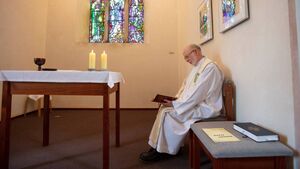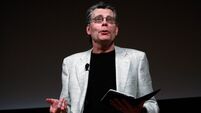We're paying a price for the loss of religion

Father Laurence Flynn prays inside St Mary's Chapel at St Patrick's Purgatory on Lough Derg, on July 27, 2020, at the height of the Covid-19 lockdown. Picture: Paul Faith/AFP via Getty Images
After the Covid-19 lockdown, a father was questioned by his daughters as to what he missed most during the long months of isolation. He thought for a moment and replied: "A lot of things but mainly two: going to Mass and attending funerals."
To say the least, his daughters were more than surprised. After a number of years in Dublin in lucrative employment and enjoying its rewards, their father’s sense of loss would have featured well down their own list and, if the truth be told, might not have featured at all. Mass, for many of their generation, Covid or no Covid, was outside their modern comfort zone, and funerals were normally outside their ambit.
They are still young, of course, and have much to learn, not least the kind of wisdom that only age can deliver, so inevitably life is viewed in primary colours and Mass and funerals and what seems outdated rituals is part of a grey zone that has often little or no significance or even meaning for their generation. Being there, done that, as they say, and they’ve long lost the tee-shirt.
Nowadays, as we know, those who attend religious services are generally from the grey (haired) zone, elders hanging in there, as congregations – once moderated by the awkward but life-giving and life-saving presence of young couples and young children – melt away with the passing years. And people begin to wonder, like the poet Philip Larkin in when churches fall completely out of use what we shall turn them into.
Once, churches were lovingly constructed and maintained, a place in Larkin’s words: . Now they are more often ignored than gravitated to as a place to grow wise in. Now life and its curiouser wisdom often seem to have little more than a brittle connection with a serious past.
I’ve mulled over this ground before – the dramatic change from a society where the toll of the church bell demanded and received a ready response to a dearth of attention to a religious impulse. And the virus continues to spread infecting structures and practices that were not too long ago hallowed by time.
A recent survey of Anglican clergy in Britain indicated that almost two-thirds of them believe that Britain is no longer a Christian country. The last census in 2021 showed a 13% drop (to 42%) in those calling themselves Christian and a 12% rise (to 37.2%) in those who declared they had ‘no religion’.
While comparable figures in Ireland are not quite that dramatic, all the indications are that similar graphs are going in the same direction. It may be, someone suggested recently, that while Irish people have no problem in rejecting their Catholicism, they are reluctant to accept that they are no longer Christian – just as it’s easier to deny a ‘religious’ impulse as long as we can take refuge in the more anemic category of ‘spiritual’. A case of the definitive Irish cop-out of having our cake and eating it.
I suspect part of the reason for the rejection of the term ‘religious’ is that religion is getting a bad press. The long litany of conflict, prejudice, exploitation and general bad odour seems to trump the religious dividend of community fellowship, moral rectitude and supports for significant relationships.
Juliet Samuel, a columnist with the , has suggested that, with the decline in religious practice, we are in danger "of forgetting the utility of things we used to know". Instead of saying our prayers at bedtime, we scroll; where once there was private meditation, now we share – constantly; and the good habits embedded by religion are now being relearned from therapists.
There is, of course, a cost to all this. The home and the hearth are being displaced with more and more people spending more and more time in soul-less places like hotel lobbies and shopping centres. The particular experiences that end up as lasting memories get shuffled to the sidelines. Life becomes less than the sum of its constituent parts as freedom from religion ends up as a series of secular truths that do little for those seeking solace in post-religious societies.
So rather than any childish sense that the loss of a religious impulse delivers a new freedom, the loss can be viewed as an impoverishment of life and spirit. It is not just a loss but a diminishment, a sadness that at the heart of life there is a gap that eventually becomes an itch, for which there is no secular antidote. No gathering to communally reflect on issues beyond our ken; no church to situate the questions that life throws up at us; no shared wisdom to help us plot a track through the maze of alternatives that life can surface; and no religious language to provide a vocabulary to help us suss out shards of meaning when a personal crisis knocks on our door.
It seems strange that at a time when, it’s natural, in Larkin’s words that , we ignore the obvious sources that would or at least might assuage the present famine. Even to the extent of wondering why your father would bother going to Mass or attending funerals.
* My new book, , is now available at €18 in the usual outlets. And at www.mayobooks.ie.





